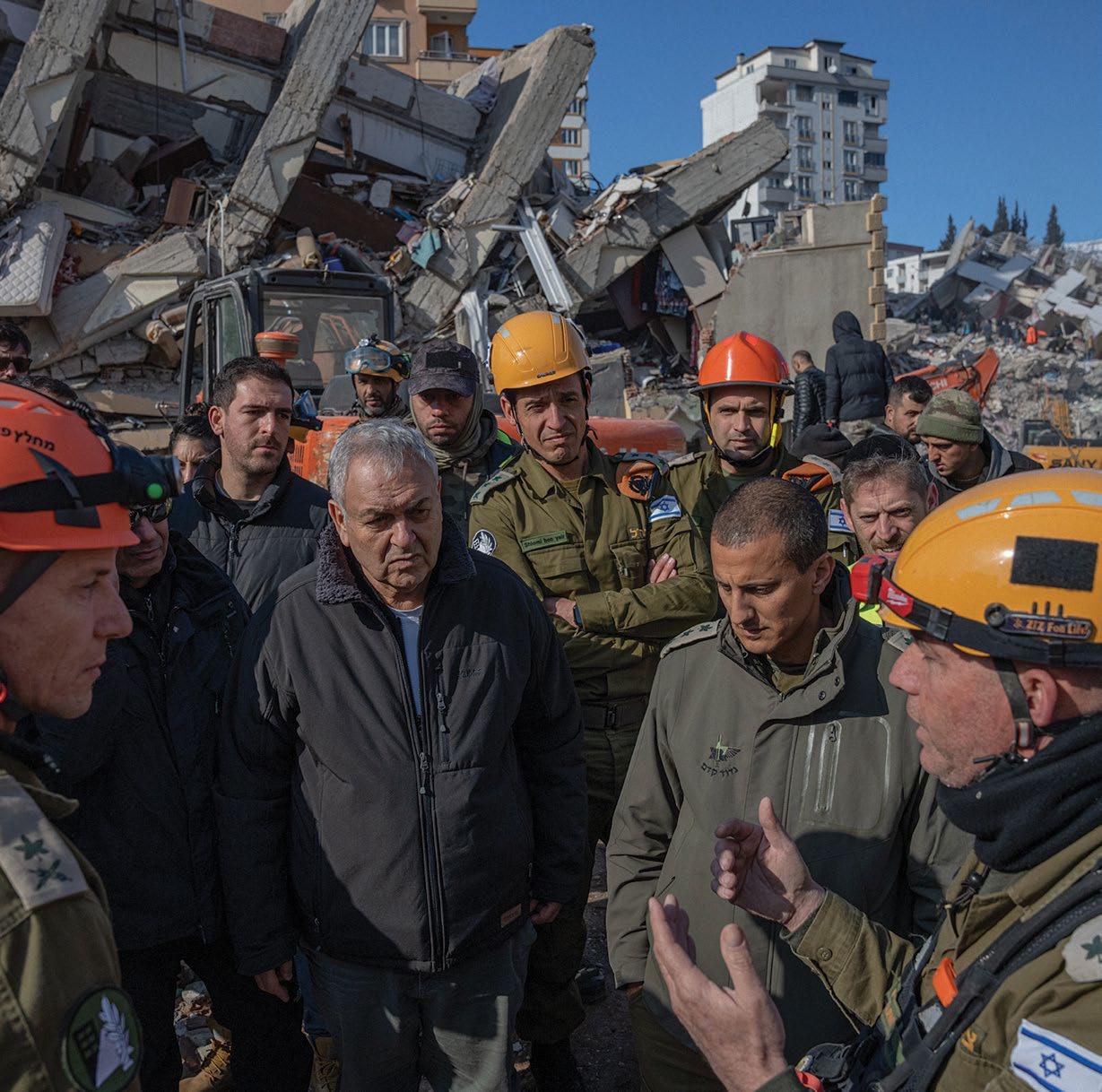
INTERNATIONAL CHRISTIAN EMBASSY JERUSALEM // MARCH/APRIL 2023 // GLOBAL EDITION ISRAEL TO THE RESCUE! FROM JERUSALEM
article on page 8)
(See
The International Christian Embassy Jerusalem was established in 1980 in recognition of the biblical significance of Jerusalem and its unique connection to the Jewish people. Today the ICEJ represents millions of Christians, churches and denominations to the nation and people of Israel. We recognise in the restoration of Israel the faithfulness of God to keep His ancient covenant with the Jewish people. Our main objectives are:
* To stand with Israel in support and friendship;
* To equip and teach the worldwide Church regarding God’s purposes with Israel and the nations of the Middle East;
* To be an active voice of reconciliation between Jews, Christians and Arabs and to support the churches and congregations in the Holy Land.
From its head offices in Jerusalem, the ICEJ reaches out to more than 170 countries, with branch offices in over 90 nations.

Our vision is:
* To reach every segment of Israeli society with a Christian testimony of comfort and love, and
* To reach and actively represent to Israel the support of denominations, churches and believers from every nation on earth.
The Christian Embassy is a non-denominational faith-based ministry supported by the voluntary contributions of our members and friends across the globe. We invite you to join with us as we minister to Israel and the Jewish people worldwide by donating to the ongoing work and witness of the ICEJ.
WORD
FROM JERUSALEM CREDITS
ICEJ President Dr. Jürgen Bühler
VP International Affairs Mojmir Kallus
VP Finance David Van der Walt
VP Operations Barry R. Denison

VP International Spokesman David Parsons
VP AID & Aliyah Nicole Yoder
Managing Editor/Publications Director Laurina Driesse
Staff Writers Annaliese Johnson
Graphic Design/Illustrator Ryan Tsuen
Administration Tobi H
Photography Shutterstock, Adobe Stock, Flash90, GPO, Getty Images, JAFI, MirYam Institute, United Hatzalah, CNET, Wikimedia Commons, Levi Dörflinger, ICEJ Staff and Branches

The New King James Bible is used for all Bible references unless otherwise noted.
Word From Jerusalem is published by the International Christian Embassy Jerusalem. Reproduction in whole or in part without written permission is prohibited. Word From Jerusalem has no subscription price and is supported through contributions worldwide. All gifts to this ministry are tax-deductible (in countries where this applies). For more information, visit us at www.icej.org
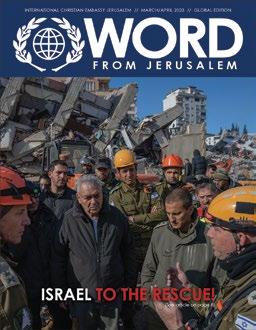
INTERNATIONAL CHRISTIAN EMBASSY JERUSALEM
P.O. Box 1192, Jerusalem • 9101002, ISRAEL
Support our ministry online at www.icej.org
FROM THE PRESIDENT’S DESK
Dear friends,
As this magazine reaches you, an unimaginable human catastrophe is still unfolding in Turkey. An area the size of Germany experienced massive destruction after two powerful earthquakes shook southeast Turkey and northwest Syria in February. The current death toll is over 45,000, and tens of thousands more are still missing. The city of Antakya, or biblical Antioch (see Acts 13:1), is in ruins.
From the start, the International Christian Embassy Jerusalem has been supporting Israel’s rescue and relief teams in Turkey. We do so, of course, to alleviate the intense suffering and loss, but also to support an encouraging dynamic between Israel and Turkey, whose relations have been warming after the definite chill of the past decade. And we are hearing amazing testimonies from the Israeli rescuers.
Some were surprised by the warm welcome they received. One rescuer reported how locals repeatedly insisted that the Israeli aid teams come to the scenes of rescue efforts. When asked why they especially want Israelis to help, they replied: “Because we trust you more than our own teams.” Another rescuer reported on a little girl pulled from the rubble. The parents were deeply moved and came to an Israeli rescuer with tears in their eyes, and gave him a small coin in thanks. They said it is a tradition to give a coin to the mother and midwife at every birth as a token of honour. “Through your help our daughter was reborn today”, they said.
In addition, we are hearing from local Turkish pastors we are supporting that some people have reported a man in white bringing them food and water as they laid buried under the rubble. Many more testimonies are emerging of God using local churches in particular at this time of great distress. We also are assisting members of the Jewish community in Antakya who were hit hard by the powerful quakes.
Meanwhile, we are witnessing a spiritual awakening thousands of miles away at the Asbury Bible School in Kentucky. A young Jewish believer led a student devotion when God first visited them. Constant prayer and worship, and a unique sense of God’s presence have manifested in this little community. Jerusalem pastor Wayne Hilsden reports that the simple meetings are characterized by the Word of God and people confessing their sins. As I write, the meetings have lasted for two weeks and there are reports of similar outpourings elsewhere.
I cannot help but think of the prophet Joel, who saw the great and terrible day of the Lord but also God’s Spirit being poured out on all flesh. We see today seismic shifts in both the heavens and the earth. These are times of great transition, and Israel and the Jewish people are right at the center of it. It is the time to dedicate our hearts fully to God, seek Him afresh, and be busy doing our Father’s work. The Lord is at hand!
I pray that as you read this issue, it will inspire you to join us in building God’s Kingdom here in Israel.
Many blessings from Jerusalem!
Dr. Jürgen Bühler President
International Christian Embassy Jerusalem
COVER PHOTO: A unit of Israel’s Rescue team take action in the aftermath of the earthquake in Turkey. (Flash90)
FOR MAGAZINE ARCHIVES visit www.icej.org/media/word-jerusalem
ISRAEL TODAY! WFJ_2023-0304
SCAN ME TO BLESS




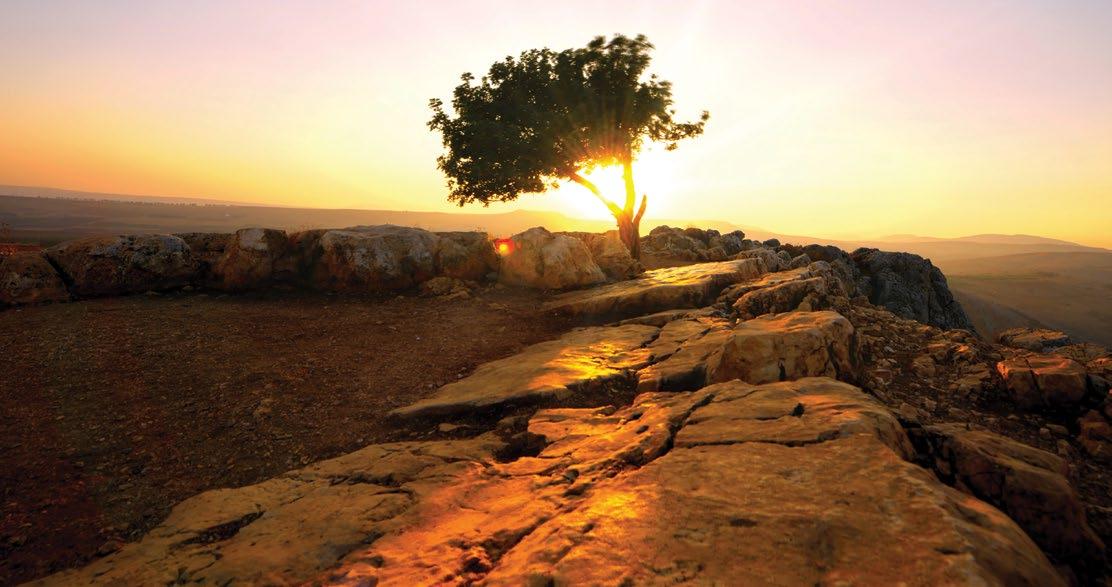
ENVISION 2023 A RICH MIX OF TEACHINGS, BRIEFINGS, FIELD TRIPS 10 20 CONTENTS MARCH/APRIL 2023 GLOBAL EDITION 4 23 ISRAEL’S NATIONAL REBIRTH AND THE DEAD SEA SCROLLS NEW FEATURED SERIES BIBLICAL ARCHAEOLOGY ABRAHAM SAW MY DAY! GROWING ROOTS IN THE LAND OF THEIR FATHERS HOLOCAUST SURVIVOR TELLS HER STORY TO PACKED GERMAN AUDIENCES 12
ABRAHAM SAW MY DAY!
BY DR. JÜRGEN BÜHLER, ICEJ PRESIDENT
In our last magazine, we showed that Abraham was perhaps the most paramount figure of the Old Testament, whose impact is still felt today. Jesus said, “Your father Abraham rejoiced to see My day, and he saw it and was glad.” (John 8:56) This statement presents a puzzling truth. Jesus indicates that Abraham already received some 1900 years ahead of time a prophetic glimpse into the life and ministry of Jesus and that it caused him great excitement.
THE KING-PRIEST
There indeed are several events that gave Abraham insights into various facets of Jesus’ ministry. We find the first one in Genesis 14, which contains what historians say is the oldest report of an armed conflict. Four invading kings (Amraphel, Arioch, Chedorlaomer and Tidal) conquered the Land of Canaan, placing their rulers under tributary submission. Some rabbis see these kings as prophetic foreshadows of the later world empires of Babylon, Persia, Greece and Rome.

During their conquest, they took captives, including Abraham’s nephew Lot. But Abraham undertook the impossible. He summoned his personal militia of 318 soldiers, chased after these conquering armies, surprised and defeated the four kings, liberated the captives (including Lot), and returned with the bounty they had taken from the Canaanite tribes (Genesis 14:13ff).

Then as Abraham returned in victory, he approached Jerusalem (the King’s valley) and “… Melchizedek king of Salem brought out bread and wine; he was the priest of God Most High.” (Genesis 14:18). This mysterious figure Melchizedek was ruler of Jerusalem, as well as the King of Righteousness (which translates Melchizedek) and King of Peace (Salem). He also served as priest of El Elyon, the Most High God, and he blessed Abraham, saying:
“Blessed be Abram by God Most High, Possessor of heaven and earth; and blessed be God Most High, who has delivered your enemies into your hand!” And Abram gave him a tenth of everything.”
(Genesis 14:19-20, ESV)
minister before the ark of the covenant). Thus, David prophesied:
“The LORD said to my Lord, ‘Sit at My right hand, till I make Your enemies Your footstool.’ The LORD shall send the rod of Your strength out of Zion. Rule in the midst of Your enemies! … The LORD has sworn and will not relent, ‘You are a priest forever according to the order of Melchizedek.’ The Lord is at Your right hand; He shall execute kings in the day of His wrath. He shall judge among the nations.” (Psalm 110:1, 4-6a)
In this passage, David sees the appearing of a future Melchizedek-type who would be elevated to the right hand of God and rule the nations. The Book of Hebrews connects the dots. The writer clearly presents him as a prophetic shadow of Jesus the Messiah, who passed through the heavens to the right hand of the Father, “having become High Priest forever according to the order of Melchizedek” (Hebrews 6:20). Hebrews chapter 7 then sets out the many parallels between Jesus and Melchizedek, and concludes: “Now this is the main point of the things we are saying: We have such a High Priest, who is seated at the right hand of the throne of the Majesty in the heavens.” (Hebrews 8:1)
Much can be said about this amazing person, yet the Bible is silent about Melchizedek until King David arises as another King-Priest of Jerusalem (he was the only Israelite king to
Even today, Jesus stands before God interceding on behalf of every believer.
TEACHING
Mount Moriah in Jerusalem, where Abraham offered Isaac (Wikimedia Commons). I.
4 | MARCH/APRIL 2023
Even today, Jesus stands before God interceding on behalf of every believer. So, just as Jesus said, we can see how “Abraham saw My day, and was glad” when he returned from battle and encountered Melchizedek in the Kings valley.
THE DAY OF THE LORD
There is another occasion when Abraham saw Jesus’ day. Genesis 18 records that three men appeared to Abraham (many theologians say they represent the triune nature of God), and one informed him that in a year’s time he would hold the son of promise in his hands. As the three departed from Abraham, the same one hesitated, saying: “Shall I hide from Abraham what I am about to do.” (Genesis 18:16ff)
What unfolded next was God’s righteous judgement on the cities of Sodom and Gomorrah. In this passage, Abraham remarkably negotiated with God but at the end not even ten righteous were found in these sinful cities. “And Abraham went early in the morning to the place where he had stood before the LORD. Then he looked toward Sodom and Gomorrah, and toward all the land of the plain; and he saw, and behold, the smoke of the land which went up like the smoke of a furnace.” (Genesis 19:27-28).
In Luke, Jesus recalled the judgement of Sodom and Gomorrah, saying the “days of the Son of Man” will be like the days of Lot (Luke 17:2830). Abraham, in a way, received a glimpse into the end times. He saw what it will be like on the great day of the Lord when Jesus returns. As in the days of Lot, Jesus said people will live superficial lives of prosperity and selfcenteredness, then sudden judgement will come. In a very real sense, Abraham witnessed the severity of God’s righteous judgement.
One thing we can learn from Abraham, he did not fatalistically submit to the announced judgement, but he stood in the gap, earnestly interceding for a lost world. Likewise, the prophet Joel pleaded: “Who knows if He will turn and relent, and leave a blessing behind Him…” (Joel 2:14a). Let us follow Abraham’s example; as we see the terrible day of the Lord
coming, let us intercede for a world ripening for God’s judgement today.
THE DAY OF REDEMPTION
Finally, the greatest moment in Abraham’s life of seeing “My day” is recounted in Genesis 22, in the story of the binding of Isaac. It was a most difficult test for Abraham. God commanded him: “Take now your son, your only son Isaac, whom you love, and go to the land of Moriah, and offer him there as a burnt offering...” (Genesis 22:2). Abraham responded immediately. Early in the morning, he departed and “took the wood of the burnt offering and laid it on Isaac his son…” (Genesis 22:6).
Isaac was already laying bound upon the altar when an angel of the Lord stopped Abraham, and he saw a ram caught in a thicket. Abraham received a sacrificial ram, (ay’il in Hebrew) – a grown, horned, male sheep. Then 2000 years later, God provided the promised lamb (seh in Hebrew). This blameless Lamb of God, a direct descendant of Abraham, carried away the sins of the world for all who trust in him (John 1:29).
This is the most profound moment in the journey of Abraham. Here, Abraham’s life became personally intertwined with God’s eternal purposes. He experienced a prophetic projection of what would take place 2000 years later, again on Mount Moriah, when God would give His beloved, only begotten Son to redeem the world. Abraham’s sacrificial dedication to God’s purposes reflected the very character of God, who was willing to give His utmost to save the world. When he watched his son climbing the hillside with wood on his back, Abraham also saw Jesus of Nazareth carrying the cross to give eternal life to all the families of the earth.

There are two points I would highlight in this remarkable prophetic scene: We can only imagine Abraham painfully making his way up the mountain. Yet a spark of faith emanates from his prophetic reassurance to Isaac, “God will provide for Himself the lamb…” (Genesis 22:8).
Secondly, when Abraham ascended Mount Moriah with his son, he not only was obedient to the fullest, he even trusted that God would raise Isaac from the dead (Hebrews 11:19). From the start, he believed they would return from the mountain together. So, in a very real way, Abraham did receive his son back from the dead.
Abraham understood beforehand the great significance of the redemptive work of Jesus, the center point of salvation history. On Mount Moriah, where Abraham declared that God would provide, the Lord indeed provided forgiveness of sins, released the resurrection power of God, and opened a way of escape from God’s eternal judgement on that great and terrible day of the Lord.
Abraham indeed looked ahead and gladly saw ‘My day’. I pray that we all can look back and see it, too! Yeshua is our Royal High Priest who is seated at the right hand of God, interceding for us. He also is the one who will come one day to judge the living and the dead (1 Peter 4:5). So, let us rejoice in the Lamb of God who forgives our sins and offers us His resurrection power even for today.
TEACHING
Jesus said: “Your father Abraham rejoiced to see My day, and he saw it and was glad.”
- John 8:56 -
Abraham’s sacrificial dedication to God’s purposes reflected the very character of God, who was willing to give His utmost to save the world.
I. The Meeting of Abraham and Melchizedek, from The Story of Abraham, print, Adriaen Collaert, after Maerten de Vos (MET, 51.501.1717(2)), wikimedia II. Abraham e Isaac camino del sacrificio, de Pedro de Orrente (Museo del Prado), wikimedia commons
5 | WORD FROM JERUSALEM
II.
WITNESSES OF ISRAEL’S ‘RESURRECTION’
DAVID PARSONS, ICEJ VICE PRESIDENT & SENIOR SPOKESMAN
As Israel prepares to mark 75 years since its modern-day rebirth in May 1948, the impact of that dramatic event is still reverberating to this day. So, what does Israel’s return to the world stage mean for us as Christians today?

To begin with, Israel’s national rebirth did involve birth pangs, as it is forever linked to the Holocaust. The ‘miracle’ of restored Jewish sovereignty in the historic Land of Israel took place just three years after the Nazi genocide against the Jews ended. The Holocaust marked the lowest point of the Jewish people’s long, hard journey of wandering among the nations. Yet only three years later, they suddenly managed to attain national independence back in their ancestral homeland.


Amazingly, the Apostle Paul declared long ago that Israel’s last-days ingathering would be like “life from the dead!” (Romans 11:15) This means the rebirth of Israel is nothing less than the resurrection power of God still at work in the earth today!
Paul based his teaching on Israel’s revival in Romans 11 on numerous Old Testament passages, such as Isaiah 6 and Jeremiah chapters 24 and 31. The Hebrew prophets describe Israel’s final restoration as a two-phase process, starting with the physical ingathering of the Jews back to the Land of Israel in unbelief, and then their spiritual ingathering back to God by a special outpouring of the Holy Spirit. “Return to Me and I will return to you”, the Lord states quite plainly in Zechariah 1:3 and Malachi 3:7. But perhaps the clearest prophetic passages on how Israel’s promised restoration would play out can be found in Ezekiel chapters 36 and 37.
In Ezekiel 36:24-28, God declares: “For I will take you from among the nations, gather you out of all countries, and bring you into your own land. Then I will sprinkle clean water on you, and you shall be clean; I will cleanse you from all your filthiness and from all your idols. I will give you a new heart and put a new spirit within you; I will take the heart of stone out of your flesh and give you a heart of flesh. I will put My Spirit within you...”
Then in Ezekiel 37 we have the vision of the Valley of Dry Bones, where the prophet speaks of a time of great calamity when the people of Israel would say: “Our bones are dry, our hope is lost, and we ourselves are cut off!” It is as if he were looking down through time at the mass graves of Jews slaughtered in the Holocaust. Yet then God declares that all is not lost; that at their very lowest moment He would assuredly “open your graves and cause you to come up from your graves, and bring you into the land of Israel. Then you shall know that I am the Lord, when I have opened your graves, O My people, and brought you up from your graves.” (Ezekiel 37:12-13)
Four times in two verses, God decrees He would bring Israel out of its graves. Therefore, Paul is able to proclaim: “For if their being cast away
I. Jews await mass execution at Sobibor death campGetty Images
6 | MARCH/APRIL 2023 TEACHING
II. Israelis dancing the Hora in May 1948 - GPO
“For if their being cast away is the reconciling of the world, what will their acceptance be but life from the dead?”
- Romans 11:15 -
is the reconciling of the world, what will their acceptance (or ingathering) be but life from the dead?” (Romans 11:15)

For 75 years now, we all have been witnesses of the resurrection power of God at work in Israel. This places much responsibility upon us. How so?
The Apostles told everyone they were “witnesses” of the death and resurrection of Jesus. In the Hebrew mindset, to be a “witness” carries a deeper meaning than just watching a crime or accident take place. It is a much weightier matter.
First, the Ten Commandments say: “Thou shalt not bear false witness.” (Exodus 20:16) Add to this the Law of Witnesses in Deuteronomy 19:1521, which states that you need two or more witnesses to establish the guilt of someone for trespassing the Law of Moses. But if a witness testifies falsely to the breaking of a law, they were subject to the same punishment as the crime they were accusing someone else of.
Therefore, the followers of Jesus would have taken a huge risk to go before the Sanhedrin and testify of its complicity in the death of Jesus. But if that opportunity ever arose, the 12 Apostles actually were the ones set apart to serve as witnesses before the Sanhedrin concerning the death and resurrection of Jesus, with all the risks that entailed –namely, the death penalty.
Then in Acts 10:39-42, Peter said to the first Gentile convert, Cornelius: “We are witnesses… chosen before by God, even to us who ate and drank with Him after He arose from the dead. And He commanded us to preach to the people, and to testify that it is He who was ordained by God to be Judge of the living and the dead.”
Paul makes a similar point when preaching to learned Greeks in Athens: “Truly, these times of ignorance God overlooked, but now commands all men everywhere to repent, because He has appointed a day on which He will judge the world in righteousness by the Man whom He has ordained. He has given assurance of this to all by raising Him from the dead.” (Acts 17:30-31)
Peter and Paul concurred that the resurrection of Jesus carried a message, that by it He was declared the Judge of all mankind. Therefore, you might have gotten away with your ignorance and idol worship in the past, but now you are accountable before God, and it is time to repent.
Every act of God’s resurrection power carries a message. When Jesus raised Lazarus from the dead, he declared, “I am the Resurrection and the Life.” (John 11:25) When God raised Jesus from the dead, He was declared to be the Judge of all humanity, and you cannot get away with your sin and ignorance of God any longer.
So, what is the message from God in resurrecting Israel from the grave in our day? First, it is that the world is about to be judged. Just as the building of the ark by Noah was the greatest sign to the ancient world they were about to be judged, the building up of Zion is the clearest sign we are about to be judged (Psalm 102:16; Isaiah 54:9). And this judgement includes how we have treated the Jewish nation and people. Psalm 2, Joel 3, Jeremiah 30:11, Zephaniah 3:8ff and other passages speak clearly of this. Secondly, the message is that we can no longer be ignorant or indifferent towards Israel.
For 75 years now, the Christian world has witnessed Israel emerging from the grave of the Shoah and placed back in their Land, a process that is still unfolding and awaits its culmination in Israel’s national salvation. When Israel was scattered and in disfavor with God, you might have gotten away with ignoring them or viewing them as being punished by the Lord. But not anymore. Once He restored Israel in their Land, this is a new day! And we will be held responsible for our reaction.

Some Christians want to put Israel back in the grave. They are working with antisemites to undermine Israel’s legitimacy and dismantle the Jewish state. They should fear God!
But there is a much larger category of Christians who are indifferent to the ongoing resurrection of Israel. They think it has nothing to do with them. But after 75 years of an Israel overcoming so many challenges and blessing all the world, we cannot remain stuck in our ignorance and indifference. Every Christian needs to connect to Israel in positive, meaningful ways.
Having a love and concern for Israel is not a litmus test of whether one is saved. But I believe it does indicate whether you are flowing with the Holy Spirit today. After 75 years of a revived Israel, if we keep clinging to the old negative views and attitudes towards the Jewish people, or still think Israel does not matter, you risk getting cut off from the move of the Holy Spirit in our day (Romans 11:20-21). And neither will God overlook this when we all stand in judgment before Him.
TEACHING
ICEJ National Directors for Finland and South Africa place a wreath at Yad Vashem’s Hall of Remembrance during Envision Leaders and Pastors Conference 2020.
7 | WORD FROM JERUSALEM
In the Hebrew mindset, being a ‘witness’ is a much weightier matter.
ISRAEL TO THE RESCUE!
ICEJ SUPPORTS ISRAEL’S TOP RESPONDERS WITH RELIEF EFFORTS IN TURKEY
BY DAVID PARSONS, ICEJ VICE PRESIDENT & SENIOR SPOKESMAN
The devastating earthquakes in Turkey and Syria in early February left over 45,000 dead and thousands more injured or buried in the massive rubble of destroyed towns and villages. The powerful tremors were also felt across Israel, prompting Israeli search-andrescue teams to be among the first to arrive on the scene of a foreign disaster once again.
The International Christian Embassy Jerusalem quickly partnered with a proven Israeli firstresponder organisation – United Hatzalah of Israel – to help bring aid and emergency services to the hardest hit regions of Turkey. The ICEJ’s support is being used to provide sorely needed warm clothing, along with firstaid kits, oxygen tanks, defibrillators and other emergency medical equipment.
Home Front Command and other Israeli firstresponders and managed to pull 19 people from the rubble of collapsed buildings, while treating scores of others for their injuries.

Sadly, the death toll in both Turkey and Syria is still rising, and the suffering and loss among the survivors is immense. Thus, we want to continue to support the aid and relief efforts of Israeli organisations in response to this ongoing tragedy.
By giving towards these efforts, you not only are demonstrating Christian compassion and helping those in desperate need, but you also are enabling Israeli humanitarian relief missions to have an even greater impact and thereby improve Israel’s standing in the eyes of the world.
The Israeli teams in Turkey eventually called an end to the search-and-rescue phase of their earthquake response, as the freezing temperatures and passage of nearly a week made it unlikely they would find more people trapped alive.
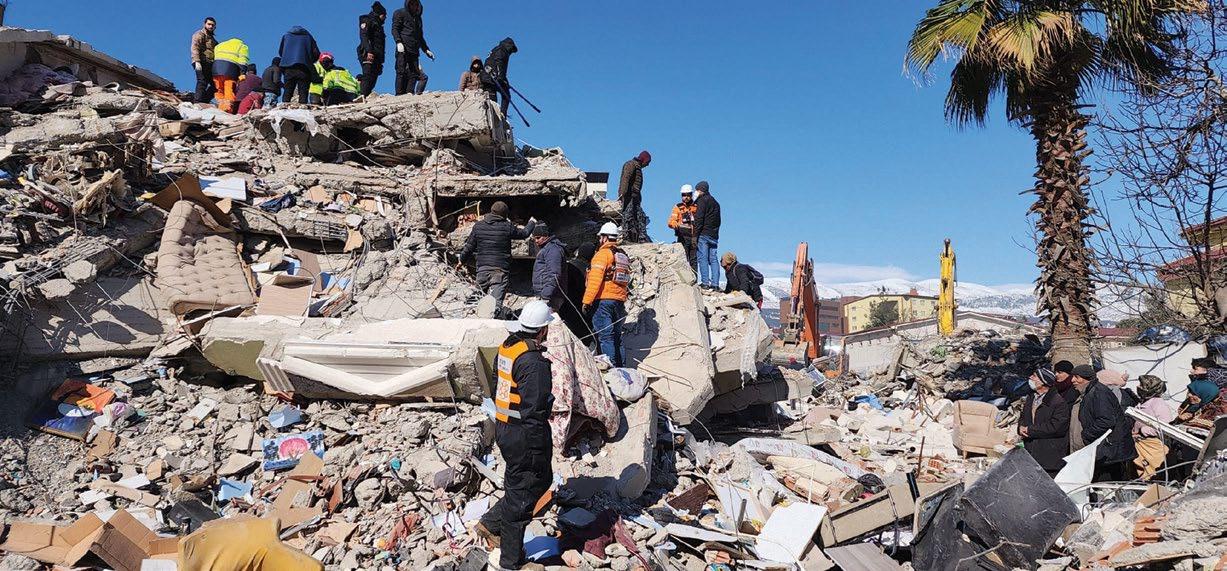
However, the humanitarian relief phase of Israel’s response to the Turkey earthquakes is continuing, and United Hatzalah is sending more medical and humanitarian aid to the region.
The ICEJ has supported similar Israeli rescue and relief missions following the Haiti earthquake of 2010, the Philippines typhoon of 2013, and the Nepal earthquake of 2015, all of which had a great positive impact for Israel.
United Hatzalah has built an impressive reputation globally for being the very first responders on the scene of accidents and terror attacks in Israel, with their 6,500 volunteer paramedics and EMTs nationwide usually arriving within three minutes of any emergency calls. This time, they dispatched some of their top medics, first-aid, and search-and-rescue teams to assist in the most devastated areas of Turkey.
The United Hatzalah rescue team began working alongside similar units from the IDF

In addition, the ICEJ was approached by The Jewish Agency for Israel to assist local Jewish communities in the impacted regions, including a number of Jewish families that were left homeless by the earthquakes. The Christian Embassy has agreed to help evacuate and resettle some of these displaced Jewish families elsewhere.
One greatly affected Turkish Jewish community was in Antakya, where the Jewish presence dates back over 2,500 years. This is actually the biblical town of “Antioch” mentioned in Acts chapters 11 and 13, where “the disciples were first called Christians…” (Acts 11:26)
Meanwhile, we also have established contacts with Turkish pastors and churches in the earthquake zone and will be assisting them with humanitarian relief aid. They are reporting miracles and changed lives even amid this immense tragedy, so it will be good to support their ‘witness’ to their mostly Muslim neighbours in this way.
So, please give generously as we join with our kind-hearted Israeli partners and local Turkish pastors in helping those shattered by the devastating earthquakes in Turkey.
8 | MARCH/APRIL 2023
CURRENT EVENTS
DONATE TODAY AT: donate.icej.org AND MAKE SURE TO DESIGNATE YOUR GIFT TO OUR INTERNATIONAL RELIEF FUND.
IDF GENERAL PINPOINTS ISRAEL’S SECURITY CHALLENGES
The new Israeli government is facing steep security challenges at home and abroad. We recently addressed them with IDF (Res) Brig. Gen. Amir Avivi, founder of the Israel Defense and Security Forum, on our ICEJ Weekly Webinar. Here are excerpts:
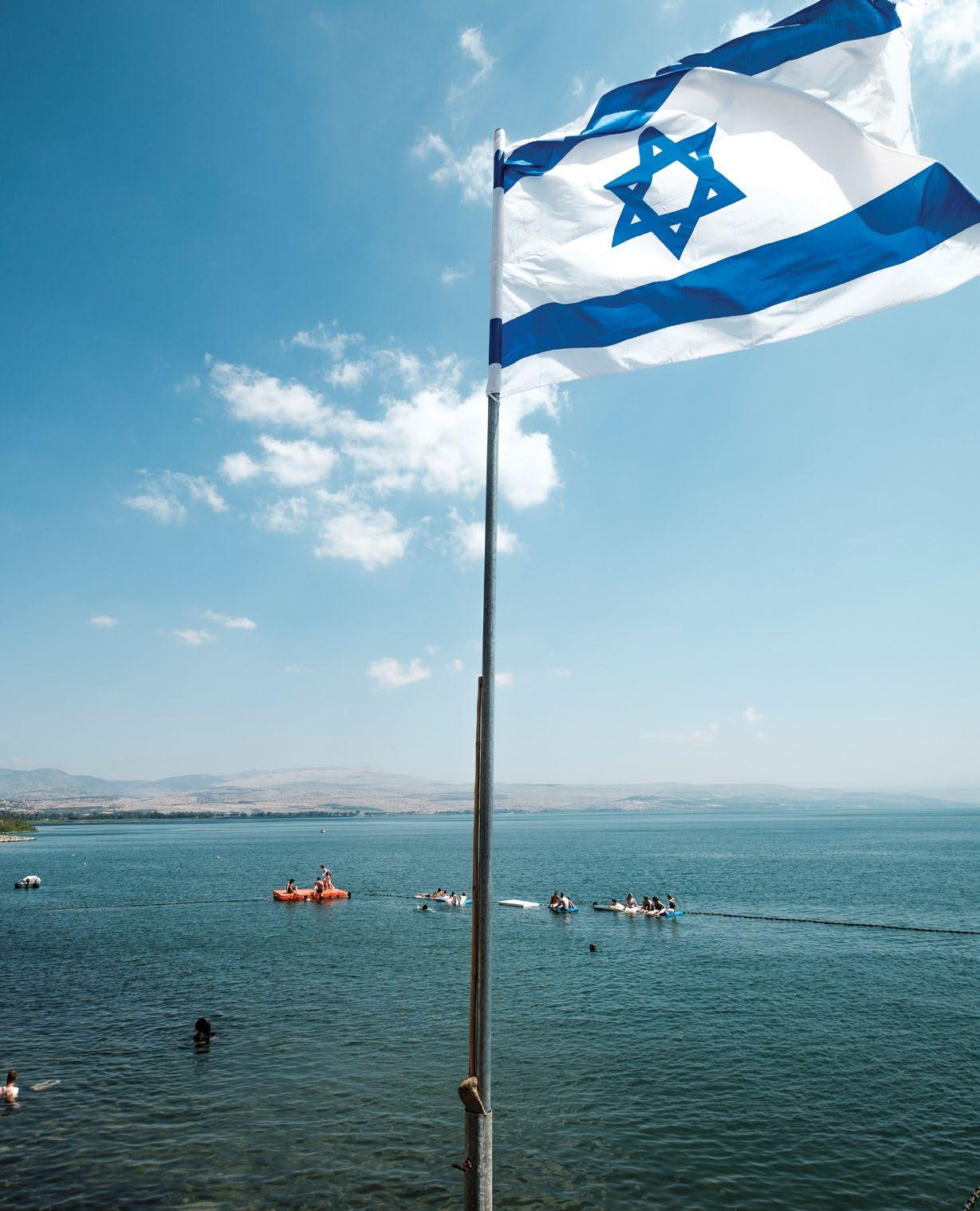
Brig. Gen. Amir Avivi: We prepared a very thorough national security assessment that was presented to Prime Minister [Benjamin] Netanyahu… We assessed that Israel has four big challenges, some of which might be existential.

The first challenge is beyond our borders, and this is the Iranian threat. Iran is aspiring to nuclear capabilities. It’s still running all these militias deployed against Israel. Hizbullah in Lebanon has accumulated more than 100,000 rockets and precision missiles. Now we see what the Russians are able to do with Iranian UAVs in Ukraine, basically destroying the Ukrainian infrastructure. They are trying to build the same in Syria but with less success, because we keep diminishing their capabilities there. They also are in Gaza, with Hamas and Islamic Jihad, and in Yemen and Iraq. So, it’s all over the place… The Iranians are trying to build a nuclear umbrella around us, and at the same time equip all these militias. This is not a new threat… But what is new is the fact that we are reaching a critical point where it cannot wait anymore. The Iranians are very, very close to nuclear capabilities. And it’s very clear today to
Israel that the main mission is taking care of the Iranian capabilities.
Now there are two ways to do that. One is Israel by itself, and we are building our capability in a way that we can defend ourselves. But the first option is to try to convince the US administration that they must lead an attack on the Iranian nuclear infrastructure. Iran is not only a threat to Israel and the Middle East, it’s a global threat. And Iran now has close alliances with the Russians and Chinese. This is a coalition against the Western world. It is time for the West to realise this.
Prime Minister Netanyahu also has talked a lot about wanting to push peace with Saudi Arabia. That’s a game changer, because Saudi Arabia is leader of the Sunni world, and it would probably mean deals with Indonesia and Pakistan. But the idea is much bigger than that… This Israeli government is going to push for a huge peace deal and to gather a US-led coalition that will deal with this very big threat of Iran and its militias. This is the most important thing this government is dealing with.
The second thing is what’s going on inside Israel’s borders… The Arabs are trying very hard to illegally grab as much land as possible. It’s happening in Judea and Samaria, in what we call Area C, and it’s happening in the Negev and Galilee… And the Palestinians are attempting to completely undermine the personal security
of Israelis. It’s not only about settlers in Judea and Samaria, it’s happening in the Negev, in Jerusalem. This government is at least talking about it and pushing forward laws that will bring more security to Israeli citizens.
Third, the Palestinian Authority is starting to collapse. The PA is a very evil entity that funds terror, that tries to delegitimize Israel all over the world, that incites against Israel in its education system, but also it’s a terrible entity for its own people… And it’s falling apart because there is a very good chance that in a year or two, the day after [PA president] Mahmoud Abbas passes, there will be anarchy and civil war in Palestinian society. All the people who might be the next Palestinian leader are arming themselves to the teeth, building their own militias. And it’s clear that the day after Abbas goes, they are going to fight each other. And where it will go nobody knows. This is a big challenge for Israel.
The fourth issue involves Jewish communities around the world. Many Jews are disconnecting from Israel, and are being affected by the delegitimization campaign led by the Palestinian Authority… And it’s affecting Jews. They are distancing themselves from Judaism, from any connection to Israel, some even become anti-Israel, which is crazy. And we’re trying to explain to the Israeli government that… we need a new approach on how to build the resilience of the Jewish communities, and how to encourage Jews to make Aliyah.
9 | WORD FROM JERUSALEM
CURRENT EVENTS
IDF (Res) Brig. Gen. Amir Avivi (MirYam Institute)
ENVISION 2023
A RICH MIX OF TEACHINGS, BRIEFINGS, FIELD TRIPS
BY ANNALIESE JOHNSON, ICEJ STAFF WRITER
For the first time in three years, the ICEJ recently hosted its annual Envision Pastors and Leaders Conference in person here in Israel. The four-day gathering convened in late January and drew some 100 Christian leaders from 25 countries up to Jerusalem, while another 130 joined online. Envision 2023 featured prominent speakers from Israel and abroad offering biblical teachings and briefings on current events, plus visits to key sites in Israel.
Envision participants heard much about modern Israel’s resilience and ingenuity, as well as biblical truths on how the Church should rightly relate to the Jewish people and state. There was a common thread running through many of the presentations concerning the historic split between Israel and the Church and the work of the Holy Spirit to bring us together today.
One speaker, for instance, noted how the Menorah had to be made from one piece of gold, representing the ‘oneness’ of Israel. A separate speaker later explained that while there were twelve tribes, each with its own stone, there was one High Priest wearing one breastplate with all twelve stones, again symbolising a unified nation before the Lord. The overriding message was that the Lord is reconciling Jewish and Gentile believers as one in Christ.
The lectures on current events addressed a variety of topics, including Israel’s role in the global energy crisis, the new Israeli government, the Abraham Accords, the Iranian threat, and other regional geo-strategic issues.


According to Asst. Prof. Elai Rettig of Bar-Ilan University, 81 percent of the world’s current energy consumption is met through fossil fuels (coal, oil and natural gas), basically the same percentage as in the 1970s,
meaning there has been little real progress towards renewal energy sources. He added that Israel is a world leader in developing solar energy, but solar panels take up vast amounts of space, a problem which Israeli researchers are trying to overcome. He also explained that the large natural gas finds offshore have made Israel a serious energy supplier, with many positive dividends in the region.
Dr. Dan Diker, President of the Jerusalem Center for Public Affairs, spoke about Israel’s geo-strategic position and faith-based diplomacy. He compared the recent Abraham Accords breakthrough to the Khartoum resolutions of 1967, when the Arab world collectively declared “no peace, no recognition, and no negotiations” with Israel. Diker also noted that while Israel is surrounded by Iranian missiles and proxy militias, it faces an even bigger threat from the Palestinian Authority due to its delegitimization campaign and slanderous accusations of racism, genocide and apartheid. Decades before the Kremlin’s recent “Nazification” of Ukraine, he added, the Soviet propaganda machine had already teamed with the PLO to “Nazify” the Jewish state.
Meanwhile, Envision delegates made several field trips, starting with a visit to the Knesset. After a guided tour of the parliament building, participants heard from Knesset member Sharren Haskel, co-chair of the Knesset Christian Allies Caucus. She stressed how important it is that Israel’s fate rests in the hands of Israelis and not the international community. MK Haskel also urged the Christian leaders to tell Israel’s real story as an imperfect but great example of peoples and minorities living side-by-side in peace.
The Envision delegates also visited Ariel University, in the biblical heartland of the Shomron (Samaria). With a diverse student body of 17,000, including many Arabs, the university is rated Israel’s second-best school for engineering (after the Technion), sends many graduates into hi-tech jobs, and is the largest pediatrics provider in the country. Ariel University’s wine research center also is truly
INSIDE THE EMBASSY
Pastor Peter Tsukahira with Dr. Dan Diker at Envision 2023
unique, as it is currently reviving some 300 native strains of wine-producing grapes dating back as far as King David some 3,000 years ago.
The Envision leaders also visited the City of David, where new discoveries are regularly being made regarding Israeli’s rich biblical heritage. This includes David’s Palace, the Gihon Spring, what may be Melchizedek’s altar, Hezekiah’s tunnel, the Pool of Siloam, and the Pilgrim’s Road leading up to Herod’s Temple.
The field trips, lectures and Bible teachings left a deep impression on everyone at this year’s Envision conference, and word got out quickly concerning the high quality of the messages delivered by our featured speakers. So, make sure your pastor attends Envision 2024!
ICEJ-FIJI ELATED AS GOVERNMENT VOWS TO OPEN JERUSALEM EMBASSY
During the ICEJ’s Envision pastors’ conference in late January, ICEJ-Fiji national director Pastor Mikaele Mudreilagi proudly announced at a gathering in the Knesset that his nation’s new government has decided to open an embassy in Jerusalem.
The new government of Fiji, led by Prime Minister Sitiveni Rabuka, made this decision as part of a coalition agreement reached to form a government following the close national elections in December 2022. He needed a small Christian party to join the coalition to gain a majority in parliament, and they made just one demand – to open an Embassy of Fiji in Jerusalem. Rabuka readily agreed, as he has been a supporter of Israel and the ICEJ for many years.
Rabuka confirmed this decision to Amb. Roi Rosenblit, the non-resident Israeli ambassador to Fiji, during his official visit to Fiji in mid-February. The Israeli ambassador in turn delivered to Rabuka an invitation letter from Israeli Prime Minister Benjamin Netanyahu to visit Israel soon.
The background to this exciting development goes back to the late Victor Schlatter, a nuclear engineer-turned-Bible translator who served for many years as an ICEJ special representative to the Pacific Island nations. He preached throughout Oceania and always brought a strong message on why Christians should support Israel. Because of his work over the decades, many of these Christian island nations in the Pacific are pro-Israel, which is even reflected in their voting patterns at the United Nations. They also send large, faithful delegations to the Feast of Tabernacles each year. And now, Fiji’s leaders are rightly aligning with God’s word by deciding to open an embassy in Jerusalem.
The ICEJ-Fiji branch has been working and praying for years for this very outcome, and they deserve much credit for making it an issue of national importance. One key figure in this effort has been Fine Ditoka, the Executive Assistant to ICEJ President Dr. Jürgen Bühler in our Jerusalem office, who hails from Fiji and previously served as a protocol officer in her nation’s Ministry of Foreign Affairs.
OUR HEART FOR HOLOCAUST SURVIVORS
On 27 January, the Christian Embassy marked International Holocaust Remembrance Day with dozens of Holocaust survivors at an event in Haifa headlined by Israeli Foreign Minister Eli Cohen and three other Knesset members. ICEJ Vice President & Senior Spokesman David Parsons represented the ministry in receiving an award for our work in caring for Holocaust survivors over the past 13 years. He told the survivors in the audience that they were true heroes for overcoming the horrors and loss of the Shoah, regaining their humanity and positive outlook on life, and helping to build the State of Israel. Some 20 residents from the ICEJ’s Haifa Home for Holocaust survivors were on hand and a group of them came on stage to perform a song in tribute to the event’s host, Shimon Sabag of our charitable partner Yad Ezer L’Haver.

January 27th has been set aside by the United Nations and European Union each year as International Holocaust Remembrance Day, as it falls on the anniversary of the Soviet Army’s liberation of the Auschwitz-Birkenau death camp in 1945. The ICEJ encourages everyone to stop to reflect on this day, to pray for Israel and the Jewish people, and to learn more about the Nazi genocide campaign against the Jews through books, documentary films and online materials.
CONSIDER PARTNERING WITH US IN CARING FOR HOLOCAUST SURVIVORS BY DONATING AT: give.icej.org/survivors

INSIDE THE EMBASSY
11 | WORD FROM JERUSALEM
GROWING ROOTS IN THE LAND OF THEIR FATHERS
BY YUDIT SETZ
The ICEJ’s Home for Holocaust survivors in Haifa has 17 new residents who recently arrived in Israel from Ukraine. Most did not voluntarily choose to make Aliyah, they were forced to flee their homes, friends and everything they had known and came to Israel with a lone suitcase of belongings. Besides needing a place to live, clothing, and other basics, their greatest need is to connect to other people, even find a community where they can put down roots in the Land of their forefathers.
THE TONGUE OF THE PROPHETS
Many of these new residents only speak Ukrainian and Russian, while a few know a little English. Sometimes they feel helpless in not being able to communicate with others, or read the names of the streets, or write their own name for local Israelis.
We decided to meet this challenge by offering them Hebrew lessons at the Haifa Home. Our newest ICEJ staff member, Maria, is a teacher and she began teaching Hebrew to these precious survivors.


doesn’t really matter if the student learns it fluently or not. The most important thing is that we communicate with each other, come together, and create a community. By doing this you are making our lives longer.”
Yet another student was eager to share her excitement about the Hebrew lessons.
“When the maintenance man came by to fix something in my home, I had offered him some cakes, which he didn’t want. However, he told me that he would like some “mayim” (water) and for the first time I understood what he wanted! And I gave him glass of water.”
After mastering the Hebrew alphabet, they slowly begin learning words and are given homework to do, and they love it!
One elderly ‘student’ commented that, “We are so blessed to have our lessons here. Many people spend so much time going somewhere for language lessons, but we can study it almost from our home. Our teacher really wants us to be successful and to learn Hebrew. It is so nice!”
Another new resident from Ukraine thanked our team for the work we are doing, saying: “Learning Hebrew is very important, but it

12 | MARCH/APRIL 2023 HAIFA HOME
ELLA SHARES HER EXPERIENCE
Ella joined the ICEJ team at the Haifa Home last year as an assistant nurse and is already making an impact on the lives of the residents. Ella knew that she wanted to put her command of languages to good use serving the people in the Land of Israel. In addition to English, Hebrew and Arabic, Ella also speaks Russian and Romanian.
Language is indeed the door to people’s hearts. Ella can see how she is able to connect in a deeper way with residents by speaking their language and explains how Rivka, a new resident who came to Israel from Romania, specifically asks her to speak in her mother tongue, even though she speaks Hebrew perfectly.
“Ella, please speak Romanian to me,” insists Rivka. This connection is precious!
“My heart is for people, and I connect easily with them and in turn they open their heart to me”, shared Ella with a smile. “Every day I feel that I am in the right place, and I am very happy to be here and serve our residents”.
nothing. People from rural areas were moved into our home.
After the eviction, we had to rent apartments and moved several streets during that time. In the winter of 1941, my father was sent to forced labour in the city of Alba Iulia. My mother was left to fend for herself and her three children.
When my father came back, he was very sick. He had lost half his weight and was a broken man. He also came back with asthma, which affected him for the remainder of his life.
After the war, we were not permitted to leave for Israel. Some people, like my brother, made their way to Israel anyway, then called “Palestine”, passing through several other countries, but they were denied entry by the British and sent to Cyprus.
Meanwhile, my family and I stayed in Romania, in the city of Bucharest. As we waited, the times were not easy, as there was hardly any food. In 1950, we finally received passports and could leave. We sailed to Israel and arrived three days later. I was 12 and a half years old. Upon our arrival, we were sprayed against lice, and then sent to Atlit, where we were housed in a residence formerly belonging to the English army. Each family received a blanket. I recall, my father brought two empty orange crates and my mother placed a tablecloth over them and that was our dining table. Regardless, my father said, “It’s so wonderful to be in Israel!”
had known earlier what this place was like, I would have moved here years ago!”
CELEBRATING BIRTHDAYS
In the Haifa Home for Holocaust survivors, every birthday is special and a victory of life! For the residents, whose ages vary from 80s to 90s, and even near or past 100 years old, many no longer look forward to aging, but their birthday is celebrated nonetheless!


The ICEJ team of workers and volunteers take it upon themselves to celebrate each and every birthday, and to visit the celebrant with a song, balloons and a personalised card just for them.
“It’s amazing that you all came to surprise me like this”, said resident Emma Kleiner on her birthday. “It makes a person feel not so all alone.”
MEET RIVKA
Now it’s time to learn more about Rivka, one of our newest residents at the Haifa Home who is currently 85 years old. Please follow along as she tells her story of surviving the Holocaust…

“I was born in Romania, in the city of Iasi, which suffered the worst of Romania’s pogroms. Ten thousand Jewish people found their death there in 1941. Before the war started, we were living in a nice, big house with a lovely garden that my grandmother bought with gold. My father worked tirelessly as a wood etcher and was a wealthy man. When the Germans came, we were thrown out of our home and left with
We lived in Atlit for eight months, and then we were moved to Tirat HaCarmel, where we stayed in a tent. Afterwards we lived in a shed for two years, until finally we were permanently housed. Later, I met my husband Eliezer, a Holocaust survivor also from Romania. We lived in Tirat HaCarmel and had two children, from which we have four grandchildren.
Two years ago, my husband got a very severe case of dementia and had to be moved to a nursing home. Living alone was difficult for me, and so finally I made the decision to move to the Haifa home. I heard about it from my cousin, who has been living here already for ten years.
I have no words. I was welcomed so beautifully. I already have a group of friends, and I sit with them every day after dinner to talk about all kinds of subjects that are important to us. If I
It is important to our team that our residents feel seen, cared for, and uplifted.
“It’s not about presents or cake,” said Chaya, who just celebrated her 90th birthday. “It’s the personal attention that matters to us.”
HAIFA HOME DONATE AT: give.icej.org/survivors
13 | WORD FROM JERUSALEM
Ella with new resident Rivka
ICEJ EXPECTS ANOTHER BANNER YEAR FOR ALIYAH
BY ANNALIESE JOHNSON
After a record year for Aliyah in 2022, the International Christian Embassy Jerusalem has begun the new year by funding Aliyah rescue flights for nearly 600 Jewish immigrants from Ethiopia, Ukraine and other former Soviet republics. ICEJ will ramp up its ground operations in a number of these countries to provide ground transportation, assistance with aliyah preparation, visa support, and airport transfers, as well as assisting new immigrants with urgent and immediate integration needs.
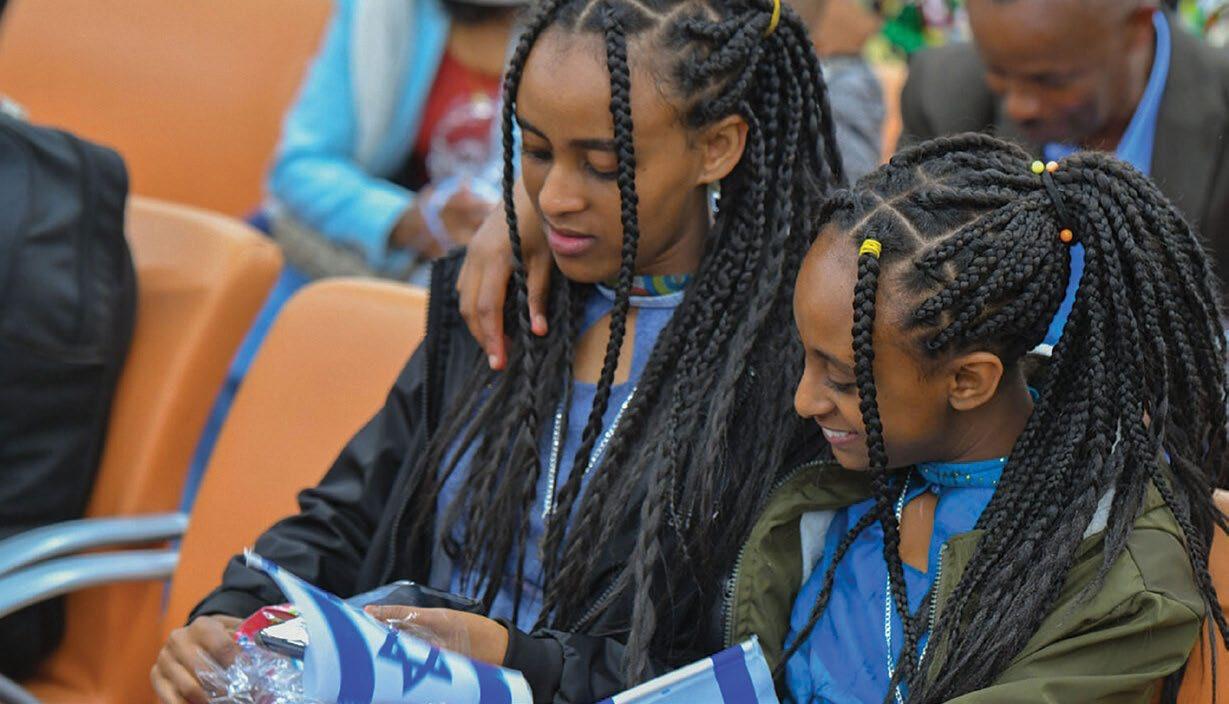
The Jewish Agency for Israel is projecting that 2023 will be another record year for Aliyah, and the ICEJ will be there to do our part, just as we have been doing since our founding in 1980.
In the Christian Embassy’s first year of operations, Finnish Christians began volunteering to assist Jews from the Soviet Union to make Aliyah and start new lives in Israel. Other European Christians in our movement soon joined in, providing humanitarian aid to Soviet Jewish families in transit and awaiting final immigration papers in Vienna, Austria. Later, even before the Soviet
Union started to collapse in 1989, ICEJ-Finland began assisting Russian Jews with their journey from Russia through Finland by bus to Israel via the Helsinki airport.
As the mass exodus of Soviet Jewry continued well into the 1990s, ICEJ supporters opened other Aliyah assistance programs, including the Raoul Wallenberg Center in Budapest, Hungary, which provided a safe house and way station for hundreds of Ukrainian Jews on their way to the Promised Land. Our first sponsored flights were from Budapest beginning in 1990.
Since the corona pandemic broke out in 2020, the ICEJ has partnered with the Jewish Agency to sponsor Aliyah flights for over 5,000 olim (new immigrants) as they have made their way home to Israel. For many of these new immigrants, this journey represents hope and the opportunity to escape difficult and even dangerous circumstances, such as wars, famine, persecution and other hardships. As one recent immigrant from Ukraine expressed, the constant rocket fire from Russian forces last year was a “living hell”, and they were extremely grateful to reach safer shores.
In 2022, there was an average of one full planeload of Jewish immigrants arriving daily in Israel for six days a week over 50 straight weeks, for a total of nearly 75,000 newcomers. More than 62,000 of these olim were from Ukraine and other former Soviet republics, representing 83% of all new immigrants to Israel last year.
Because of the war in Ukraine and the resulting political and economic uncertainty in neighboring countries, last year saw a 383% jump in Aliyah from the year before. Whereas 12,958 Russian-speaking Jews moved to Israel in 2021, a total of 62,569 arrived in 2022. JAFI officials fully expect to see the current surge in Aliyah requests from these countries to continue well into 2023, as many Jewish families are desperately working towards leaving before the rules for emigrating could change in their countries. Thanks to our faithful Christian supporters worldwide, the ICEJ is ready to assist them on their journey home to Israel.
For our Aliyah efforts in Ukraine, we are aiding with flights, ground transport and accommodations as Jewish families flee wartorn areas. The ICEJ was able to help rescue
Ethiopian Jewish sisters arriving in Israel (JAFI).
AID & ALIYAH PROJECTS 14 | MARCH/APRIL 2023
over a thousand immigrants in 2022 from the dreadful conflict ravaging Ukraine, and our flights will continue to take place in this difficult situation, lifting Jews out of a dark, cold winter into the bright future of a new life here in Israel. As the prophet Zechariah once warned: “‘Up, up! ‘Flee from the land of the north,’ says the LORD…” (Zechariah 2:6).
An exciting new opportunity also has opened for the ICEJ in the Baltic states, where we are sponsoring all the Aliyah flights in 2023 from this region, which has a rich Jewish heritage. This includes assisting with all the JAFI events connected with Aliyah, such as summer and winter camps, seminars, Jewish holiday event and much more. We already flew 57 Jewish immigrants from the Baltic region in January, and 50 more will be arriving in Israel in the coming weeks.

Meanwhile, the Ethiopian Aliyah has resumed, with two flights from Addis Ababa landing recently with 124 Jews on board. The ICEJ will continue to play a central role in this unique Jewish community’s historic journey home. In fact, the Christian Embassy has sponsored flights for over 3,000 Ethiopian Jewish immigrants since 2011. The biggest year was 2017, when we sponsored the homecoming of 1,116 Jews from Ethiopia to Israel.
The ICEJ has been involved in the Ethiopian Aliyah since 1992, when we provided a mobile

clinic and as well as an Amharic-speaking doctor to treat newly arrived Ethiopian immigrants with special medical needs. These were Ethiopian Jews who had somehow endured severe famine, plagues and civil war to reunite with the Jewish people in their ancient homeland.
Every year brings new challenges and opportunities, and new immigrants to Israel. We can clearly see God’s hand at work as He continues to regather the dispersed Jewish exiles from the four corners of the earth and plant them back in the Land of Israel, just as He promised in His word. Indeed, the Lord
told Jeremiah: “Yes, I will rejoice over them to do them good, and I will assuredly plant them in this land, with all My heart and with all My soul.”
(Jeremiah 32:41)
As Christians from the nations, we have a biblical invitation to help in this great prophetic Ingathering, an invite issued thousands of years ago through Isaiah: “Thus says the Lord God: ‘Behold, I will lift My hand in an oath to the nations, and set up My standard for the peoples; They shall bring your sons in their arms, and your daughters shall be carried on their shoulders.’” (Isaiah 49:22)
May the Lord bless you for responding to this prophetic summons to be involved in the promised Return of Israel to her biblical homeland. Please consider a generous gift to help us bring more Jews on Aliyah rescue flights and resettle them in Israel in 2023.

AID & ALIYAH PROJECTS
Disabled Ukrainian Jew being assisted onto flight to Israel (JAFI)
DONATE TODAY AT: give.icej.org/aliyah 15 | WORD FROM JERUSALEM
Jewish immigrants to Israel spend their last Shabbat in Ukraine (JAFI)
WHEN LIFE GIVES YOU LEMONS… ISRAELIS MAKE LEMONADE

 BY NICK HANSEN, ICEJ-DENMARK NATIONAL DIRECTOR
BY NICK HANSEN, ICEJ-DENMARK NATIONAL DIRECTOR
The clouds over our heads tell us rain is coming, but we are on a mission and have no time to stop. I’m standing in the heart of a kibbutz called Erez, right at the border with Gaza. Together with ICEJ Vice President of Aid & Aliyah Nicole Yoder and our team, we have come here to inspect the equipment that donors of the Christian Embassy have so generously provided. We walk through the kibbutz as the local chief of security explains the current situation. This day, we are going to visit several places not just to inspect, but also to see what new initiatives are being taken to ensure a brighter future for these front-line Israeli communities.
Earlier in the day, we had met up with Rabbi Shmuel Bowman, executive director of Operation Lifeshield and a long-time partner of ICEJ. We got together at a parking lot, and as soon as we said ‘hello’, he took out a map. This was a good oldfashioned paper map that can be folded and put in the glove compartment. He put it on the windshield of the car and started drawing on the map.

“This is where we are going. The dashed line indicates the 40 km line from Gaza, where the Hamas rockets can reach us”, said Shmuel while drawing his own thick line along the edge of the Gaza border. “This is the 7-kilometer line from the Gaza border. Here we do not wear our seatbelt, so we can get out of the car fast in case a mortar shell or rocket comes. We just had one rocket shelling a week ago.”
Our trek took us through the heartland of Israel, from the Jerusalem hills to the lush, green valley that surrounds Sderot. I sat next to Rabbi Shmuel in the car and we talked about Scripture and prophecy. As we passed by the Elah Valley, we talked about David overcoming the giant, the meaning of the five stones, and how the spirit of David still endures in the Israeli people.
We first came to a kindergarten to inaugurate two brand-new portable bomb shelters donated by the ICEJ global family. This kindergarten only has 17 seconds to bring the 40+ children to safety when the siren goes off. Up until now they had no protection.

Shmuel looked at me and said, “It’s a miracle that no one has been injured so far. When it is bad, 400 rockets a day fly over the heads of these children. This will give the staff and parents the safety and peace of mind they need, knowing that the children will be protected.”
Now at Kibbutz Erez, we inspect a light ATV firefighter and a heavy trailer with a big water tank donated by Christians. Shmuel explains to me what this is about.

“Terrorists in Gaza have been sending over balloons with explosives or kites with burning devices attached to them, just to burn the fields and orchards. They don’t care what happens. If a community catches on fire, great. If they burn the fields and destroy the economy of the area, fine. If they destroy the wildlife and the animals, so be it. And so, the question is, how do you extinguish a fire as quickly as possible,
when a big fire truck cannot get to where the fire is happening in the middle of a field? The only way to do it is with an ATV, as it can go anywhere and get there fast. This saves lives and it saves homes, businesses and nature.”
Shmuel looks at me with stern, concerned eyes, explaining the absolute necessity for the fire-fighting equipment.
“The idea came from the fact that we talked to security chiefs, and asked, what do you need? And they said very clearly, a vehicle that can take us immediately, as fast as possible to where the fire begins. If you can catch it right at the beginning, then you can contain it. If you wait a
AID & ALIYAH PROJECTS
Rabbi Shmuel Bowman and Nick Hansen inspect fire-fighting equipment
16 | MARCH/APRIL 2023
At the kindergarten where a brand new portable bomb shelter was donated
few minutes, it expands exponentially”, he said. “I’ve been in six field fires, and they literally look like ocean waves of fire, waves of fire literally sweeping over the area, destroying everything.”
As I walk around the place, see the orchards of lemon and orange trees, and look over the border into Gaza, I cannot help but imagine what the price of living here must be for the local Israeli families. I turn to Shmuel and toss him a question.
“If I and my children were living here and I would experience what they are experiencing, I would be filled with rage and hatred. Is that what you sense in this community?”
With a firm voice, he responds, “Not at all! What I’m sensing here is hope and optimism. I’m recognizing an understanding that the enemies, the people who are shooting the rockets, are just a small percentage of the total population of the people of Gaza. And they understand that there are two million Palestinians that are suffering under their totalitarian rule. Our war is not with the Palestinian people and these kibbutzim
here understand that. So, it’s ironic and it’s interesting. This is our land, and something in us is saying we will not back down. You would think that these kibbutzim would be filled with rage and revenge. In fact, this place is growing, people are moving in, and there are even people on the waiting list.”
I then come to realise that this must be the same ‘spirit of David’ that we talked about earlier that day — the strong will to overcome all odds.
As our visit comes to an end, we stand in the middle of the rows of citrus trees, where the keeper tells us to take as much fruit as we like. It is harvest season and the trees are loaded with oranges, mandarins and lemons – the branches all hanging low under the weight. I see the abundance of this place. I peel an orange

that I just picked from the tree and find it so sweet and juicy. Everybody lights up as they taste the magnificent fruit of this embattled corner of Israel.
And as I consider the resilience of the Israelis living here in this difficult place, I think to myself, “when life gives you lemons….”
To help provide more life-saving mobile bomb shelters and fire-fighting equipment to Israeli communities under constant terror threat, please give to our Israeli in Crisis fund.
GIVE TO:

give.icej.org/crisis
HELPING JEWISH FAMILIES KEEP THE PASSOVER
For most Jewish families, Passover is the most important holiday on the Hebrew calendar, as they gather for the special Seder meal which retells the story of Moses leading the children of Israel out of bondage in Egypt.

Each year the ICEJ helps many disadvantaged Israeli families celebrate the Passover according to tradition. This year, the need is great due to the lingering economic impact of the corona lockdowns, even as the global energy crisis continues to drive up the costs of living, and especially food prices. As a result, Israeli social workers are receiving many requests for assistance this Passover.
This year’s Passover celebration begins on the evening of 5 April 2023. Working with Israeli social workers across Israel, the ICEJ will be delivering gift baskets with groceries, food vouchers, and kitchen items so

families have all they need to enjoy the Passover seder meal. In addition, the ICEJ plans to deliver holiday gift baskets to new immigrant families in need, as well as fund a number of community seder meals.

Please join us in giving hope to Israeli families in need of help to celebrate the Passover festival.
Donate today at: give.icej.org/givinghope
AID & ALIYAH PROJECTS
A plaque is placed onto a newly installed shelter with thanks to our partners from around the world.
A freshly picked orange right from the orange grove.
A SHORT HISTORY OF CHRISTIAN ZIONISM FROM THE REFORMATION TO THE TWENTY-FIRST CENTURY by Donald M. Lewis BOOK

36 USD
EQUIP - Your personal journey to the Kingdom. by Peter Tsukahira BOOK

24 USD
SITTING AT THE FEET OF RABBI JESUS by Ann Spangler & Lois Tverberg BOOK

24 USD
FLOODGATES by David R. Parsons BOOK

17 USD
MESSIANIC PASSOVER HAGGADA BOOK

13.50 USD
THE POWER OF WORDS by Shaun Boshoff BOOK


18 USD
PLUSH SITTING BEAR ISRAELI/ IDF SOUVENIRS

12 USD
100 DAILY HEBREW ENCOURAGEMENTS: FIRE by Shaun Boshoff BOOK
18 USD

EMBASSY RESOURCES // WWW.ICEJSTORE.COM
For full product descriptions visit our online store!
SUPER SALE
For full product descriptions visit our online store!
2023 ICEJ CALENDAR
The Land of Promise SOUVENIR

5 USD SUPER SALE!
ICEJ BOTTLE 'THE LAND OF PROMISE' MERCHANDISE

15 USD
PRAYER SHAWL (TALLIT) Available in 2 sizes SOUVENIR

23-30 USD
JERUSALEM COMPASS SOUVENIR
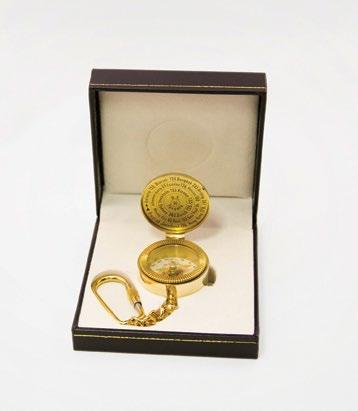
43 USD
VISIT OUR ONLINE STORE AND RECEIVE A 10% DISCOUNT ON ALL PURCHASES!
Go to: ICEJSTORE.COM and use the discount code: 2023WFJICEJ – The special 10% discount for your purchases at Embassy Resources is valid throughout 2023.

EMBASSY RESOURCES // WWW.ICEJSTORE.COM
HOLOCAUST SURVIVOR TELLS HER STORY TO PACKED GERMAN AUDIENCES
 BY ICEJ STAFF
BY ICEJ STAFF
In January, Holocaust survivor Eva Erben traveled to Germany to tell her story of suffering and loss to packed audiences, including over 3,000 German students, as part of a four-day speaking tour arranged by ICEJ-Germany to mark International Holocaust Remembrance Day.
Eva Erben, a 92 year-old Czech Jew from Ashkelon ended the tour at a large gathering in Stuttgart that drew over 2,100 German students – a record number for a Holocaust remembrance event.

The ICEJ’s German branch has invited Eva for several speaking tours now. They are always noted for her warm interactions with young German students eager to hear Eva’s personal story of surviving the Holocaust. Many times, Eva has been interviewed on stage by Germany’s most popular TV presenter, Günter Jauch.
Born in 1930 in Czechoslovakia, Eva lost her parents and grandparents in the Nazi genocide against the Jews. Somehow, she survived the Terezin, Auschwitz and Gross-Rosen concentration camps, as well as a grueling Death March late in the war that claimed her mother’s life. Three separate times, she stood in selection lines and came face-to-face with the monstrous Dr. Josef Mengele. After the war, she made her way to Israel and raised a family.
In December 1941, Eva’s family was taken to the Terezin camp, which was presented in Nazi propaganda as a model camp, though conditions
were very difficult. In 1944, the family was sent to Auschwitz. Upon arrival at the notorious death camp, she stood for the first time in a selection line filing by Dr. Mengele. Eva recalls only looking down and seeing his shiny black boots. Though 14 years old, she had been told to lie that she was 18, which kept her alive to work.
Later, Eva and her mother were forced to walk to the Gross-Rosen camp. While leaving Auschwitz, a Nazi soldier gave her two left shoes to wear. She tried to swap one for a right shoe, but the soldier hit her in the face with his gun butt, dislodging two front teeth. So, she started walking to the new camp with two left shoes and two missing teeth.
Soon after, they were forced on a “Death March,” walking up to 30 kilometers per day. If you were too weak, they shot you, Eva explained. One marcher who did not make it was her frail mother. Eva was now an orphaned teen who weighed a mere 25 kilos.
A few nights later, the remaining marchers sheltered in a barn. Exhausted, Eva laid down in some straw that smelled of cow urine. When she awoke the next morning, everyone was gone, as the dogs used by the German soldiers to round up marchers did not smell her in the hay.
It was now late April 1945, and the war was almost over. Eva started walking east and finally came to a river, where she heard the click of a gun. A German soldier was readying to shoot her, but another soldier told him to save the bullet, as she was dying anyway. She fainted and woke up the next day on the farm of a Czech Catholic family who nursed her back to health. When Israel was founded three years later, she made her way there with Peter, a friend from Terezin who became her husband.
“Saving that one bullet has brought me three children, nine grandchildren and 15 great-grandchildren,” Eva told her German listeners.
For 40 years, Eva blocked out the war and anything to do with Germany. That is until 1980, when she met some German youths traveling across Israel who were genuinely interested in the country and people. After that, she could speak German again, and in recent years she has repeatedly visited Germany to tell her story before gatherings large and small. Eva has become especially popular among German youths.
Eva added that one day of remembering the Holocaust each year is not so much to ask, given that her fellow survivors live with their memories every day. She concluded that it is extremely important for people to learn from history and stand up against antisemitism, now posing as anti-Israelism.
FEAST OF TABERNACLES 2020 20 | MARCH/APRIL 2023 ICEJ INTERNATIONAL
Holocaust survivor Eva Erben, a 92 year-old Czech Jew on a speaking tour in Stuttgart Germany
FAITH DIPLOMACY AS A TOOL TO COMBAT ANTISEMITISM
 BY MIGUEL MUÑOZ VALERIANO, ICEJ SPANISH INTERNATIONAL SPOKESMAN
BY MIGUEL MUÑOZ VALERIANO, ICEJ SPANISH INTERNATIONAL SPOKESMAN
In January, the Israel Allies Foundation and the Movement to Combat Antisemitism organised the “Latin America Summit on Israel” in Miami, Florida. The forum was aimed at Christian parliamentarians and political leaders in Latin America, to promote legislation and ministerial agreements that adopt the IHRA definition of Antisemitism in order to better fight this racial hatred. I was honoured to represent the International Christian Embassy Jerusalem at this gathering and to present the theme “religious diplomacy as a practical tool to combat antisemitism.”
Religious or faith diplomacy is a form of international relations that relies on religious principles and values to build and foster collaboration between countries, cultures and religions. It maintains that shared values can bridge divisions, build trust, foster dialogue and mutual understanding, and reach consensus. This
form of diplomacy uses faith as a force for good that is capable of addressing political and social issues. It focuses on promoting justice, reconciling parties, and showing mutual respect and solidarity – with peace as the ultimate goal.
My starting point in challenging the congress members on faith diplomacy was to present my proposal for a definition that honours our Judeo-Christian heritage. I proposed as its essential principles the three great virtues which the Apostle Paul established as standards for mature Christians in the New Testament: faith, hope and love (cf, 1 Thessalonians 1:3). Similar values emanate from the “Sermon on the Mount”: justice (Matthew 5:6), common welfare (Luke 12:30-31) and peace (Mark 9:50).
Diplomacy for Christians should flow from our FAITH, and present solutions to strengthen PEACE and unity among cooperating nations. We should respect the rights and freedoms of others out of an obligation to LOVE them and seek their WELL-BEING as fellow citizens regardless of race or religion. With HOPE, it seeks constant cooperation based on JUSTICE and other shared values.
“Since we have that same spirit of faith, we also believe and therefore speak.” (2 Corinthians 4:13 / NIV). Faith is at the core of our identity as Christians. We demonstrate that faith through works and action. Otherwise, it is “dead faith”. Christian leaders must let our actions match our beliefs. Hence the humble but sincere challenge I made to the Latin American Summit: Legislate in favour of the people of God!
Faith diplomacy is a key tool for greater multilateral cooperation on behalf of Israel, to release the promised blessing to “all the families of the earth”. (Genesis 12:3) To that end, we encourage adopting the IHRA definition of Antisemitism!
ICEJ-IRELAND HOSTS ANNUAL
CONFERENCE
BY ICEJ STAFF WRITER
ICEJ-Ireland, under the direction of Brian Silvester and his faithful team, hosted its annual national conference in January, drawing over 200 Christians from both the Republic of Ireland and Northern Ireland. The attendance was larger than expected following three years of cancelled conferences due to Covid, but participants were now eager to get together for fellowship and teachings on Israel. Another draw was the rich worship sessions by three different musical teams, including two younger worship groups that attracted many attendees from the next generation.
Barry Denison, ICEJ Vice President for Operations, came from Jerusalem to join the roster of speakers, which also included Brian Silvester and Stephen Cargin.


After the two-day conference, Barry ended the weekend ministry trip by speaking in the Sunday morning services at two churches in Belfast. There also were productive meetings with local pastors who were new to the work of the Christian Embassy.
Barry was accompanied by his wife Deborah Denison, and in every location he also shared about her time volunteering as a trauma nurse for the IDF’s “Operation Good Neighbor”, which involved Christian medical teams going into southern Syria during its long, brutal civil war to treat the wounded.
ICEJ INTERNATIONAL
21 | WORD FROM JERUSALEM
The forum of Israel Allies Foundation and the Movement to Combat Antisemitism
THE GREAT LEGACY OF THE HEBREW BIBLE

 BY DAVID PARSONS, ICEJ VICE PRESIDENT & SENIOR SPOKESMAN
BY DAVID PARSONS, ICEJ VICE PRESIDENT & SENIOR SPOKESMAN
When we consider the Jewish roots of the Christian faith, it all begins with the Scriptures we share in common – the Hebrew Bible. On this point, the Apostle Paul stated a simple yet enduring truth that “to them were committed the oracles of God” (Romans 3:2).
Indeed, all the Holy Scriptures we hold dear –both Old and New Testament – were written by Jews, operating under the inspiration of the Holy Spirit. As some have said, the Jews were God’s “scribes” in delivering His eternal Word to us.
Nearly every religion has sacred books, yet none are as old or have as much wisdom, truth, revelation, inspiration and accuracy as the amazing book we call the Bible. It is not only the most widely-read and best-selling book of all time, it is also the first holy book to be written using an alphabet.
In ancient times, the first written languages were pictorial in nature – such as Egyptian hieroglyphics, Mesopotamia cuneiform, and the Chinese language characters that have survived to this day. They all seemed to emerge independently in distant cultures around 5,000 years ago, using thousands of pictograms and marks to represent sounds, syllables or concepts used in the spoken languages of that day. And only the very learned could read, write and understand these vast arrays of symbols.
In contrast, scholars say our modern-day alphabets only began developing around 3,500 years ago, and there is mounting evidence that the first language to employ a small set of alphabetic letters was Hebrew.

The earliest alphabetic inscriptions ever found were in a proto-Semitic form and were discovered in 1905 by British archaeologist William Flinders Petrie on the walls of a cave in the Sinai. He proposed they were made by the Israelites as they journeyed from Egypt to the Promised Land. Then in 1916, a British Egyptologist named Alan Gardiner further
concluded the Sinai cave inscriptions used an alphabet derived from shortened forms of Egyptian hieroglyphics. He and others have theorized that this early proto-Hebraic alphabet was developed around 2000 BC by Semitic peoples working or trading in Egypt in order to communicate better with the Egyptians.
The ICEJ screened a documentary film on this topic at a recent Feast of Tabernacles which credits the Hebrew patriarch Joseph – who is described as a wise man in Genesis 41:39 – with having developed this first alphabet to help his family understand their Egyptian hosts better (“Patterns of Evidence: The Moses Controversy”, with Timothy Mahoney).
Unlike the older pictorial language scripts, the development of the alphabet seems to have only one point of origin, and all our modern alphabets descend from it. Interestingly, the word alphabet itself is derived from the first two letters of the Hebrew language: “aleph” and “bet”.
This was a revolutionary leap in the advancement of humanity – a language reduced to 22 letters that anyone could learn, allowing them to read and write just like the scribes and nobles.
By the time Israel reached Sinai, God delivered to them the Ten Commandments and all the Torah in an easy-to-use Hebrew script, with the repeated instructions to “teach them to your
children” (Leviticus 10:11; Deuteronomy 4:9-10, 6:7, 11:19, 31:19). Isaiah adds: “All your children shall be taught by the Lord, and great shall be the peace of your children.” (Isaiah 54:13)
Thus, Israel became the first nation not only to develop an alphabet, but also universal literacy among their people. In his commentary series on Exodus, Rabbi Jonathan Sacks sees this evidenced in the book of Judges, when Gideon “caught a young man of the men of Succoth and interrogated him; and he wrote down for him the leaders of Succoth and its elders, seventy-seven men” (Judges 8:14). Gideon rightly assumed this young Israelite could read and write.
If you want to know the secret why so many Jews are so learned and successful and win Nobel prizes, it is because they have always placed a premium on being a literate people, which arose from the Lord’s command to teach the Word of God to their children even from a young age. This has greatly separated the Jews from other peoples over the centuries. And it is a legacy they bequeathed to Christians, who also began to emphasize that everyone should learn to read and write at a young age, largely to be able to read the Bible.
So, if you want to explore the Hebraic roots of our Christian faith, start with a word of thanks to God and the Jewish people for the Bible itself and even for our own alphabets.
JEWISH ROOTS
22 | MARCH/APRIL 2023
The Codex Sassoon, believed to be the oldest complete Hebrew Bible dating back 1,100 years, is to be auctioned in May 2023. (cnet.com)
ISRAEL’S NATIONAL REBIRTH AND THE DEAD SEA SCROLLS
BY DAVID PARSONS, ICEJ VICE PRESIDENT & SENIOR SPOKESMAN
As David Ben-Gurion prepared to declare the reborn State of Israel 75 years ago this May, another major event in Jewish history was just transpiring – the discovery of the Dead Sea Scrolls. In fact, on the very same day the United Nations voted the previous November to create a Jewish state in Mandatory Palestine, a leading Hebrew University archaeologist confirmed the far-reaching historic significance of the scrolls.
The Dead Sea Scrolls are widely recognised today as the greatest treasure trove of ancient original religious manuscripts ever found. They both verify sacred biblical texts and reveal intricate details of Jewish faith and culture in the late Second Temple era.

The timing of these two events could not have been more striking – right as Israel was about to be revived as a nation in its ancestral homeland after 2,000 years of exile, that land gave up incredible secrets of its rich Jewish past. The timing also could not have been more critical, for if the archaeologist had waited another day to take custody and examine the first batch of scrolls, they may have never made it into Jewish hands.
The first scrolls were found in February 1947 by a Bedouin shepherd boy searching for a lost sheep near the ruins of Qumran, an ancient Jewish community at the north end of the Dead Sea. He tossed a stone into a cave opening above him, heard the sound of pottery cracking, and climbed into the cave with a friend to discover two large jars filled with old parchments.
Months later, the boys showed the scrolls to two antiquities dealers in Bethlehem. The Arab dealers accompanied the shepherd boys back to the cave to search for more, and altogether they came up with seven intact scrolls.
Curious as to what they had discovered, they asked an Armenian acquaintance in the Old City of Jerusalem to find an antiquities expert who could assess their significance. He, in turn, contacted Eleazar Sukenik, an archaeology professor at Hebrew University.
By now, British forces were about to leave Mandate Palestine and violence was brewing between Jews and Arabs. The British had divided Jerusalem into military zones with barbed wire separating Jewish and Arab neighbourhoods. It was hard to move between zones, but Sukenik agreed to meet the Armenian broker near a checkpoint and got his first peak at one of the scrolls through the security fence. He noticed it resembled the Hebrew scripts found etched in first-century Jewish tombs around Jerusalem.
This spurred his interest enough to consider venturing to Bethlehem to meet the two Arab dealers and see their scrolls up close. But the UN was about to vote on partition that very day, 28 November, and he knew clashes would erupt immediately if a Jewish state was approved. Yet suddenly, news came that the vote had been delayed for a day. So, he decided at great personal risk to head to Bethlehem the next morning and return with the scrolls before the UN convened again in New York.
On 29 November 1947, Sukenik boarded an Arab bus for Bethlehem and met the dealers, who loaned him three parchments for closer analysis. He rushed back home with the scrolls, and immediately deciphered them as ancient Jewish religious manuscripts which today are known as the “Thanksgiving Scroll” and the “War Scroll” from Qumran cave 1. The third scroll contained portions of Isaiah (the entire Book of Isaiah was later found and today is housed in the Shrine of the Book in Jerusalem).

As Sukenik pondered the enormity of these finds, news came over the radio that the UN had approved the creation of a Jewish state. He joined his family and neighbours out in the streets of Jerusalem to celebrate the decision.
By the next morning, fighting had erupted on numerous fronts across the land.
Sukenik died just a few years later, but his son Yigal Yadin, a renowned IDF military commander, took up his profession and became one of Israel’s foremost archaeological experts.
Yadin would later write of his father’s breakthrough discovery: “I cannot avoid the feeling that there is something symbolic in the discovery of the scrolls and their acquisition at the moment of the creation of the State of Israel. It is as if these manuscripts had been waiting in caves for two thousand years, ever since the destruction of Israel’s independence until the people of Israel had returned to their home and regained their freedom.”
BIBLICAL ARCHAEOLOGY
The Isaiah Scroll housed in the Shrine of the Book in Jerusalem (Flash90)
Professor Eleazar Sukenik
29 September - 6 october 2023

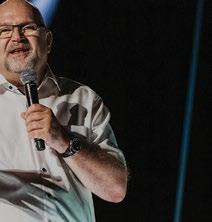
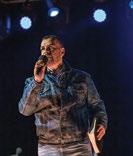

• Two days in the Galilee • Five days in Jerusalem • Roll Call of the Nations
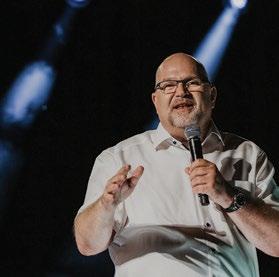



• Communion at Garden Tomb • Jerusalem March • Prayer Vigil
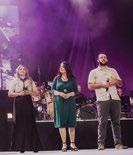


• Solidarity visit to the Negev


feast.icej.org
“For God is the King of all the earth; Sing praises with understanding.”


Psalm 47:7

Stay tuned for more info on Land Packages and Online Feast packages!






































 BY NICK HANSEN, ICEJ-DENMARK NATIONAL DIRECTOR
BY NICK HANSEN, ICEJ-DENMARK NATIONAL DIRECTOR





















 BY ICEJ STAFF
BY ICEJ STAFF

 BY MIGUEL MUÑOZ VALERIANO, ICEJ SPANISH INTERNATIONAL SPOKESMAN
BY MIGUEL MUÑOZ VALERIANO, ICEJ SPANISH INTERNATIONAL SPOKESMAN



 BY DAVID PARSONS, ICEJ VICE PRESIDENT & SENIOR SPOKESMAN
BY DAVID PARSONS, ICEJ VICE PRESIDENT & SENIOR SPOKESMAN



















